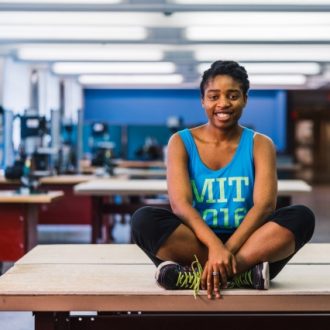Finding Wonderland
Senior Marie Elimbi Moudio enters a “weird place” and discovers a world of possibility.
By Meg MurphyMarie Elimbi Moudio ’16 is at home in the machine shop. Its familiar smells — oil, metal, dust — never fail to comfort her. She inhales deeply and thinks, “I’m a mechanical engineer. I make things.”
As a native of Cameroon and a woman, Moudio has embraced an academic discipline and a way of life that defy expectations, both her own and those of others. Her decision to attend MIT at all surprised her family and dashed their hopes that she would study medicine. Once here, she endured a difficult period of trial and error, struggling for focus until she found her home in the Department of Mechanical Engineering (MechE).
“I thought everyone at MIT would be about science all the time. Instead I found strong humanities here and a rich intellectual culture,” Moudio says. “Mechanical engineering attracted me because it gave me the flexibility to delve into a range of things — mechanics, materials, fluid and thermal sciences, and so on. This is liberal arts. It’s a multidisciplinary field that mixes a ton of things.”
Moudio knows she made the right choice, but she’s also aware that things look a little different from Cameroon, where, she says, many people believe that intellectual girls will never marry and there is outright disdain for single women in professions considered “male.” “You’re really pushing it if you study engineering — which is just completely silly,” she says. “I want to show Cameroonian girls that living an academic life does not mean throwing away your future. It means you have the freedom to think in new ways,” she said.
For Moudio, mechanical engineering provided exactly the right path to the future. The creative design process has required she develop complex problem solving skills. She has learned to develop strategies, find solutions, test ideas, and think nimbly. She says such an education is a gift and, for her, carries with it a responsibility.
This is why Moudio knows the path she’s on will lead her home to Cameroon. The lure of cutting-edge American universities and hubs of innovation is enticing, she admits, “but sometimes when you stay away from home too long, you lose touch with what is happening on the ground. Cameroon is where I can be of most help. My skills will be infinitely more valuable there.”
She intends to push for innovation in Africa. Her undergraduate research seeks to remedy widespread energy needs in developing countries. She is considering how to make biomass, such as wood and agricultural waste, a more efficient fuel source, and the implications for her homeland are vast.
About 2.5 billion people in developing countries rely heavily on such low-density biomass for over 90 percent of their household energy needs, yet much of it is wasted. In Sub-Saharan Africa and India, for example, 10 exajoules of biomass — nearly 20 percent of the energy needs in developing countries — is lost every year. Moudio and her colleagues seek to optimize the use of torrefaction systems, reactors that heat biomass at a very high temperatures of 250 to 300 degrees Celsius to produce a high-density fuel known as char. Unused biomass becomes an energy source. Small-scale models could one day be used by struggling farmers throughout the world.
Opening new possibilities is something MIT does well, said Moudio. She nearly passed up an admission offer for fear the experience would be narrow but has found just the opposite. The place quickly grew on her — at least once the cultural shock subsided. Her first impression when she arrived on campus — inspired by Simmons Hall, which looked to her like a spaceship — was: “MIT is a weird place.”
But “weird” quickly turned to quirky and charming. She found the student body favored sweatpants. Rather than listening in silence, students blurted out answers and challenged professors during lectures. Early on, she attended a party where people dressed in sheer clothing, as if naked, and rode an elaborate self-constructed merry-go-round. “I was like, ‘How crazy does it get here?’” By the time spring rolled around, she was nonplussed to come across students in superhero costumes during final exams.
Soon Moudio will graduate from MIT able to apply the principles of engineering, physics, and material sciences to the design and production of mechanical systems. She will pursue graduate work, return home, and, like many others before her, quite possibly go on to change the world. But she’ll miss the haunted house that students design with nerdy precision every single year, the robots, unicycles, gliders and countless other contraptions that are among the many sights that now lead her to say, with casual pride: “Only at MIT.”
